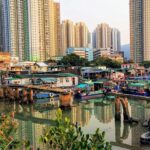Posts tagged with 'urbanization'
The built environment is not on track globally to achieve its sectoral climate targets. Accounting for over a third of total energy system emissions already, the continued use of carbon-intensive materials paired with inefficient energy use throughout the built environment ...

In the face of rapid urbanization, evolving mobility patterns and the looming climate crisis, the Sustainable Cities Challenge emerges as a pioneering initiative providing a catalytic approach to drive progress. Launched by the Toyota Mobility Foundation in collaboration with WRI ...

In December 2023, the floods in Chennai and neighboring districts of Tamil Nadu wreaked havoc on the lives and livelihoods of thousands of people. However, Tamil Nadu is not the only state to be impacted by the rising hazards of ...

Research around the world shows that pollution levels can vary enormously within the same city and even within the same neighborhood. Local monitoring data can thus prove essential to understanding air pollution sources, how they affect different communities and groups, ...

Amazonian cities are diverse in opportunities and needs. The region’s biodiversity is among the world’s most important, but its cities’ sustainability challenges are less well-known. These jurisdictions require financial support and capacity building to create sustainable, conservation-oriented, equitable, urban green ...

The International Day of Play (IDOP), held annually on June 11th, is a unifying global moment to celebrate the power of play for all children everywhere. IDOP draws attention to Article 31 of the UN Convention on the Rights of ...

Bogotá, Colombia is in the throes of a water crisis. After several months of dry weather caused by El Niño, the Chingaza reservoir system, which provides 70% of Bogotá’s water, reached its lowest level in history. The city’s over 8 million residents are ...

Climate-change-induced events such as heat waves and floods severely impact quality of life in urban areas. It can be financially disruptive and even fatal, disproportionately impacting settlements most vulnerable to climate risks. Greening of open spaces can be an important ...

In the crowded slums of Zambia, Africa, members of the Zambia Youth Federation, a social movement of the urban poor, conducted climate change research and presented it in an emotional spoken word poem. Their message let policymakers know how climate ...

Like many parts of Africa, motorcycles are the most popular form of transportation among Rwanda’s 13.3 million people. Whether they’re commuting to work or school, transporting jugs of water from the local taps or just running everyday errands, people on ...

2023 was hot but ultimately hopeful. The past year saw record-breaking temperatures and an onslaught of extreme weather events like droughts, floods and heatwaves. Cities often bore the brunt of these conditions, exacerbated by the urban heat island effect: when ...

India aims to reduce the emissions intensity of its economy by 45% by 2030, compared to 2005 levels, and to achieve net-zero emissions by 2070. The country can’t achieve either goal without a radical transformation in its buildings and construction sector, which was responsible for around 17% of the nation’s ...

By David Waskow, Jennifer Layke, Nate Warszawski, Preety Bhandari, Gabrielle Swaby, Natalia Alayza, Jamal Srouji, Mario Julien Díaz, Edward Davey, Rogier van den Berg, Roman Czebiniak, Paige Langer and Nathan Cogswell on December 19, 2023
The COP28 climate talks began with a new fund to address the increasingly severe losses and damage vulnerable countries face from climate impacts and concluded with the first international agreement to tackle climate change’s main driver: fossil fuels. Those bookends to the Dubai summit ...

Cities have always been dynamic hubs of culture, education, economic growth and opportunity, and most importantly, centers of social interaction attracting residents and visitors alike. It is no surprise then, that Asia and the Pacific have become increasingly more urban ...

Earlier this year, India surpassed China to become the most populous country in the world. And with 68% of the world’s population projected to live in urban areas by 2050, India is expected to see an additional 416 million urban dwellers. ...

Page 2 of 11123...10...Last »



























